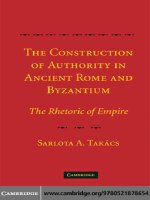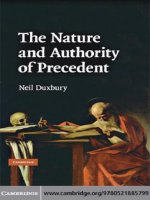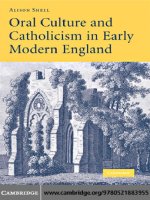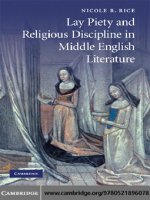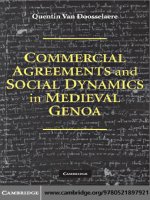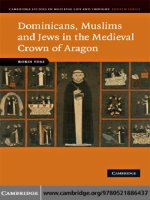0521843030 cambridge university press literature nationalism and memory in early modern england and wales nov 2004
Bạn đang xem bản rút gọn của tài liệu. Xem và tải ngay bản đầy đủ của tài liệu tại đây (1.37 MB, 208 trang )
This page intentionally left blank
LITERATURE, NATIONALISM, AND MEMORY IN EARLY
MODERN ENGLAND AND WALES
The Tudor era has long been associated with the rise of nationalism in
England, yet nationalist writing in this period often involved the
denigration and outright denial of Englishness. Philip Schwyzer
argues that the ancient, insular, and imperial nation imagined in
the works of writers such as Shakespeare and Spenser was not
England but Britain. Disclaiming their Anglo-Saxon ancestry, the
English sought their origins in a nostalgic vision of British antiquity.
Focusing on texts including The Faerie Queene, English and Welsh
antiquarian works, The Mirror for Magistrates, Henry V, and King
Lear, Schwyzer charts the genesis, development, and disintegration of
British nationalism in the sixteenth and early seventeenth centuries.
An important contribution to the expanding scholarship on early
modern Britishness, this is the first study of its kind to give detailed
attention to Welsh texts and traditions, arguing that Welsh sources
crucially influenced the development of English literature and
identity.
PHILIP SCHWYZER is Lecturer in Renaissance Literature and Culture
at the University of Exeter. He is co-editor of Archipelagic Identities:
Literature and Identity in the Atlantic Archipelago, 1550–1800 (2004), and
has published on early modern English and Welsh literature and
identity in journals including Representations.
LITERATURE, NATIONALISM,
AND MEMORY IN EARLY
MODERN ENGLAND AND
WALES
PHILIP SCHWYZER
cambridge university press
Cambridge, New York, Melbourne, Madrid, Cape Town, Singapore, São Paulo
Cambridge University Press
The Edinburgh Building, Cambridge cb2 2ru, UK
Published in the United States of America by Cambridge University Press, New York
www.cambridge.org
Information on this title: www.cambridge.org/9780521843034
© Philip Schwyzer 2004
This publication is in copyright. Subject to statutory exception and to the provision of
relevant collective licensing agreements, no reproduction of any part may take place
without the written permission of Cambridge University Press.
First published in print format 2004
isbn-13
isbn-10
978-0-511-22990-9 eBook (EBL)
0-511-22990-9 eBook (EBL)
isbn-13
isbn-10
978-0-521-84303-4 hardback
0-521-84303-0 hardback
Cambridge University Press has no responsibility for the persistence or accuracy of urls
for external or third-party internet websites referred to in this publication, and does not
guarantee that any content on such websites is, or will remain, accurate or appropriate.
For Naomi
Contents
Acknowledgments
ix
Note on the text
xi
Introduction: remembering Britain
1
1 Spenser’s spark: British blood and British nationalism in
the Tudor era
13
2 Bale’s books and Aske’s abbeys: nostalgia and the aesthetics
of nationhood
49
3 ‘‘Awake, lovely Wales’’: national identity and cultural memory
76
4 Ghosts of a nation: A Mirror For Magistrates and the poetry
of spectral complaint
97
5 ‘‘I am Welsh, you know’’: the nation in Henry V
126
6 ‘‘Is this the promised end?’’ James I, King Lear, and the
strange death of Tudor Britain
151
Bibliography
175
175
179
Primary sources
Secondary sources
190
Index
vii
Acknowledgments
These acknowledgments, like the book itself, deal with the rich splendors
of the past. In this case, however, the splendors are in no way fictitious.
They consist in the many people who have been so remarkably generous
with their time, advice, and support over the last ten years. This book
began as a dissertation written at the University of California, Berkeley,
where I benefited from the warm and alert guidance of my director, Jeffrey
Knapp. I am also deeply grateful to Jennifer Miller for her interest and faith
in this project from the earliest stages, and to Ruth Tringham for providing
the vital (if, in the following pages, somewhat buried) perspective of
archaeology. A special and enduring debt of thanks is owed to Stephen
Greenblatt, from whose advice and support I have benefited for many
years. At Hertford College, Oxford, where I was Junior Research Fellow in
the years 1999–2001, I received generous assistance and conversation from
Emma Smith. Since then, I have found myself fortunate in my colleagues
at the University of Exeter, and wish to thank in particular Karen Edwards,
Regenia Gagnier, Colin MacCabe, Nick McDowell, and Andrew McRae.
This book has been written as a contribution and a response to the
emerging interdisciplinary field of early modern British (or ‘‘Archipelagic’’)
Studies. Whether because the approach is still relatively new, or because of
the stress it lays on inclusivity, or simply by great good luck, I have found
the scholars in this area unusually supportive and interested in the work of a
junior colleague. I’m especially grateful to David Baker, Kate Chedgzoy,
Andrew Hadfield, John Kerrigan, Willy Maley, and Swen Voekel for the
help they offered as I ventured down the paths they were opening. Here I
should also thank the two readers of the manuscript for Cambridge
University Press for guidance of the best kind. I also wish to express thanks
to Lesel Dawson, Matthew Fisher, Clare Harraway, Daniel Hedley, Jason
Lawrence, Ruth McElroy, Simon Mealor, Julian Murphet, and Dominic
Oliver. As my intellectual and academic role models and interlocutors (and
for a great deal else), I am grateful to Alison, Hubert, and Hugo Schwyzer.
ix
x
Acknowledgments
This book is dedicated to Naomi Howell, whose influence and ideas are
felt on every page, and who, in our daily life together, proves some of its
central arguments about beauty and nostalgia entirely wrong.
An earlier version of chapter 2 appeared as ‘‘The Beauties of the Land:
Bale’s Books, Aske’s Abbeys, and the Aesthetics of Nationhood’’ in
Renaissance Quarterly (2004). The first pages of chapter 3 rework sections
of ‘‘British History and ‘The British History’: The Same Old Story?’’ in
British Identities and English Renaissance Literature, ed. David Baker and
Willy Maley (Cambridge: Cambridge University Press, 2002), pp. 11–23.
Note on the text
All quotations retain the spelling of the edition cited, but u/v and i/j have
been regularized throughout. Punctuation and capitalization have been
lightly modernized where appropriate.
All references to Shakespeare’s works are to The Norton Shakespeare, ed.
Stephen Greenblatt (New York: W. W. Norton, 1997). All references to
Spenser’s Faerie Queene are to Edmund Spenser, The Faerie Queene, ed.
A. C. Hamilton (London: Longman, 1977).
xi
INTRODUCTION
Remembering Britain
In November 2000, the Romanian poet Corneliu Vadim Tudor came
a surprisingly strong second in his country’s presidential elections. The
leader of the far-right Greater Romania Party, Vadim Tudor had risen to
national prominence with calls for the ethnic cleansing of Hungarians and
gypsies. When questioned by a British journalist about his ultra-nationalist
policies, the poet retorted: ‘‘Yes, I am a nationalist. Jonathan Swift was a
nationalist. William Shakespeare was a nationalist. There is nothing wrong
with being a nationalist. It means to love your country.’’1 This response
succinctly raises several of the questions central to this book. What does it
mean to be a nationalist? Was Shakespeare a nationalist? Is there something
about nationalism as a doctrine that makes it particularly attractive to
poets? And does the phrase ‘‘Tudor nationalism’’ have any meaning, outside
of Romania?
As Corneliu Vadim Tudor went on to explain, ‘‘what is wrong is to be an
extremist, a chauvinist, a xenophobe.’’ While it is difficult to see how all of
these terms do not also apply to the Romanian poet, the distinction being
drawn is important. Not all nationalists, in all times and places, have been
xenophobes, nor are all xenophobes necessarily nationalists. The latter
point is particularly pertinent to our understanding of sixteenth-century
England, where the evidence of strong ethnic loyalties and the hatred of
‘‘strangers’’ is incontrovertible. From the anti-alien riots of Ill May Day
(1517) to the boisterous chauvinism of William Haughton’s Englishmen for
My Money (1598), there is no question that Tudor England was a thoroughly and unapologetically xenophobic society. Yet to acknowledge this is
quite different from accepting that England in this era was a nation or that
1
Nick Thorpe, ‘‘Romanians Gamble with their Future,’’ BBC News: From Our Own Correspondent,
Sunday December 3, 2000; />newsid_1052000/1052551.stm. Following his initial strong showing, Vadim Tudor was soundly
beaten in a run-off election on December 10, 2000.
1
2
Literature, Nationalism, and Memory
its inhabitants tended to be English nationalists. Indeed, the development
of national consciousness arguably requires individuals to rise above the
very same xenophobic impulses to which Tudor subjects were so notoriously prone.
One of the distinctive features of national communities, even the most
apparently exclusive or xenophobic, is their boundless inclusiveness when
it comes to two sorts of ‘‘strangers’’: the dead, and the unborn. As Benedict
Anderson has put it, while ‘‘nation-states are widely conceded to be ‘new’
and ‘historical,’ the nations to which they give political expression always
loom out of an immemorial past, and . . . glide into a limitless future.’’2
Coming to national consciousness is not simply a matter of accepting that
the people over the hill, whom one has never met, are part of the same
community – the people under the hill must be acknowledged too. For
many nationalists, the affective and political claims of the dead easily
outweigh those of the living. W. B. Yeats was hardly alone in his tendency
to embrace the dead and unborn with an ardor he withheld from those
presently alive:
Scorn the sort now growing up
All out of shape from toe to top . . .
Sing the lords and ladies gay
That were beaten into the clay
Through seven heroic centuries;
Cast your mind on other days
That we in coming days may be
Still the indomitable Irishry.3
As a way of living in and through history, nationalism involves a special
understanding of the relationship between the present and the past, and a
peculiarly intimate communion with the national dead. For the nation to
live in the imagination of its members, they must come to recognize that
those who lived in ‘‘other days,’’ and whose customs, politics, and even
language may at first glance appear dauntingly alien, were all along
members of the same community – that ‘‘they’’ were in fact ‘‘us.’’ This
book is a study of why and how English and Welsh writers of the Tudor era
were capable of taking this remarkable imaginative leap. The leap was a
particularly extraordinary one for the English, I shall argue, for the ancients
2
3
Benedict Anderson, Imagined Communities: Reflections on the Origin and Spread of Nationalism,
revised edition (London: Verso, 1991), pp. 11–12.
W. B. Yeats, ‘‘Under Ben Bulben,’’ in The Collected Works of W. B. Yeats, ed. Richard J. Finneran
(London: Macmillan, 1983), p. 327.
Introduction: Remembering Britain
3
with whom they were required to imagine community were not their own
ancestors. They were not even English.
The Tudor era was long associated by literary historians with the
‘‘discovery of England’’ – the process by which the English people became
proudly conscious of their national language, geography, history, and
destiny. A host of recent critical interventions, by Richard Helgerson,
Andrew Hadfield, Claire McEachern, David Baker, Jodi Mikalachki, and
Willy Maley among others, have challenged this comfortable narrative in a
variety of ways.4 They have demonstrated conclusively that England, like
all nations, was not there to be ‘‘discovered,’’ but had rather to be invented or
constructed – even ‘‘written.’’ Moreover, Englishness is not a self-generated
but rather a relational identity, a matter of complex and often bitter
negotiation among the nations of the Atlantic archipelago (England,
Ireland, Scotland, and Wales). These arguments have won the day to the
extent of largely ceasing to be controversial, at least in broad terms, and
within academic circles. At the same time, however, one central assumption of the old ‘‘Discovery of England’’ narrative has persisted all but
unchallenged. Scholars still tend to assume that the nation constructed,
invented, or written by the English in the sixteenth century was, indeed,
England.5 By contrast, I intend to argue that national consciousness in
Tudor England was largely ‘‘British’’ rather than narrowly ‘‘English’’ in its
content and character.
Most studies of nationalism in early modern and modern Britain take it
for granted that a sense of being Welsh, Scottish, or English is historically
prior to and more fundamental than an awareness of being British. Linda
Colley’s remarkably influential book, Britons: Forging the Nation, 1707–1837,
4
5
See Richard Helgerson, Forms of Nationhood: The Elizabethan Writing of England (Chicago:
University of Chicago Press, 1992); Andrew Hadfield, Literature, Politics and National Identity:
Reformation to Renaissance (Cambridge: Cambridge University Press, 1994), and Shakespeare,
Spenser, and the Matter of Britain (Basingstoke: Palgrave, 2003); Claire McEachern, The Poetics of
English Nationhood, 1590–1612 (Cambridge: Cambridge University Press, 1996); David J. Baker,
Between Nations: Shakespeare, Spenser, Marvell, and the Question of Britain (Stanford: Stanford
University Press, 1997); Jodi Mikalachki, The Legacy of Boadicea: Gender and Nation in Early
Modern England (London: Routledge, 1998); British Identities and English Renaissance Literature, ed.
David Baker and Willy Maley (Cambridge: Cambridge University Press, 2002); Willy Maley,
Nation, State and Empire in English Renaissance Literature: Shakespeare to Milton (Basingstoke:
Palgrave Macmillan, 2003). John Kerrigan’s forthcoming study of British themes and problems in
the literature of the seventeenth century will mark an important contribution to this field.
David J. Baker, in Between Nations, comes closest to challenging this assumption. However, he still
tends to see Britishness in its various guises as confronting, complicating, or undermining a preexisting English identity. The difference between Baker’s position and my own may be to some
extent a matter of emphasis.
4
Literature, Nationalism, and Memory
has merely strengthened the traditional perception that only after the
union of Scotland and England in 1707 did the peoples of these kingdoms
(and of Wales) begin to regard themselves as Britons. In contemporary
debates over the future of the United Kingdom, the relative belatedness of
Britishness is a point on which all sides seem prepared to agree. To its
defenders, Britishness presents a more advanced and ‘‘civic’’ stage of
nationalism than that to which, say, Scottishness can aspire; demands for
the devolution of sovereignty to Britain’s constituent nations can thus be
branded as atavistic, a dangerous descent into tribalism. For its opponents,
on the other hand, Britishness is no more than the wool that England
pulled over the eyes of Scotland and Wales in 1707; devolution and
(potentially) independence for these nations can thus be heralded as the
restoration of older and more authentic identities.
Those seeking to demonstrate that Scotland, Wales, and England were
authentic nations before the idea of Britain came into being generally look
to the late medieval and early modern periods. Scottishness is summed up
in the Declaration of Arbroath (fourteenth century), Welshness in the
revolt of Owain Glyndwr (fifteenth century), and Englishness – curiously
tardy – in the triumph of the Reformation, the defeat of the Armada, and
the history plays of William Shakespeare (sixteenth century). A number of
historians are justly skeptical about the relevance of the former examples to
modern ideas of Scottish and Welsh nationhood; for the moment, I will
limit myself to considering the case of England. There is no doubt that the
Reformation and subsequent conflicts with Catholic powers encouraged
the development of national consciousness in England, at least among
a vocal minority, and that we find this consciousness expressed in
Shakespeare’s plays. The question is whether this national consciousness
was in fact English.
Let us begin by considering this question in relation to the most well-known
celebration of ‘‘England’’ found in Elizabethan literature. ‘‘This England,’’
so memorably extolled by Shakespeare’s John of Gaunt in Richard II, turns
out, rather remarkably, to be an island: ‘‘this scept’red isle . . . This precious
stone set in the silver sea’’ (2.1.40, 46).6 This topographical slippage is of
course testimony to the notorious and still-witnessed tendency of the
6
All references to the play are from The Norton Shakespeare, ed. Stephen Greenblatt (New York:
W. W. Norton, 1997). On Gaunt’s notorious slip, see Kate Chedgzoy, ‘‘This Pleasant and
Sceptered Isle: Insular Fantasies of National Identity in Anne Dowriche’s The French Historie and
William Shakespeare’s Richard II, ’’ in Archipelagic Identities: Literature and Identity in the Early
Modern Atlantic Archipelago, ed. Philip Schwyzer and Simon Mealor (Aldershot: Ashgate, 2004).
Introduction: Remembering Britain
5
English to forget the existence of their northern and western neighbors –
but the long history of English arrogance should not prevent us from
recognizing how much that arrogance may depend on ascribing to
England qualities that are not in fact English. Insularity – British insularity –
is not merely one agreeable attribute of John of Gaunt’s England, it is its
defining feature, referred to repeatedly from the beginning to the end of the
panegyric. Grasping this, we are in a position to see how little of his speech
in fact applies to the historical English nation. If the isle itself is to be
considered ‘‘scept’red,’’ a ‘‘royal throne of kings,’’ the reference must be to
the pre-Anglo-Saxon era, when Britain was indeed thought to have been
ruled by a single monarch. If ‘‘England’’ has proved a ‘‘fortress . . . Against
the envy of less happier lands’’ (2.1.43, 49), this can hardly apply to the
defensive achievements of the English, who had barely consolidated their
rule over one corner of Britain before succumbing to the invading Danes
and Normans in rapid succession – for examples of foreign invaders
effectively repelled we must turn to the eras of Cassivellaunus and King
Arthur. Similarly, if England was ever ‘‘wont to conquer others,’’ the
reference is more probably to Arthur’s fabled conquests in Europe and
beyond than to the futile efforts of later English kings to defend their
inherited territories in France. Finally, who are the ‘‘happy breed’’ who call
this island theirs? Gaunt is not, in all probability, thinking of the racial
stock of the Anglo-Saxons, who were held in remarkably low esteem in the
Elizabethan era.
As this analysis of Gaunt’s speech indicates, ‘‘England’’ in the Tudor era
was a name to conjure with – but what it conjured was very often Britain.
England itself, the state bounded by the Wye and Tweed with its roots in
the old kingdom of Wessex, was woefully inadequate to the nationalism of
the English. The tendency of the English to lay claim to the historical and
geographical attributes of Britain had been witnessed for centuries, but this
tendency was greatly intensified – indeed, it became an imperative – in the
Tudor era, particularly in the wake of the Reformation. The very nature of
the traumatic break entailed by the Reformation, cutting England off from
most of the continent, encouraged the English to regard themselves as
inhabiting a world apart – as penitus toto divisos orbe, in Virgil’s well-known
phrase. That phrase, of course, applied to the entire island of Britain, and it
was in insularity that the English discerned the key to their unique and
sacred national destiny.7 Nor was simple geographical logic the only factor
7
See Jeffrey Knapp, An Empire Nowhere: England, America, and Literature from Utopia to The
Tempest (Berkeley: University of California Press, 1992).
6
Literature, Nationalism, and Memory
in determining the cast of English national consciousness in the sixteenth
century. Equally important, as I shall demonstrate in chapter 1, were the
presence on the throne of a dynasty thought to be descended from the ancient
(pre-Anglo-Saxon and pre-Roman) rulers of Britain, and the need, following
the Reformation, to assert the existence of an ancient British Empire and
British Church, uncorrupted by and older than their Roman competitors.8
Later English nationalism, as it developed from the seventeenth through
the nineteenth centuries, would celebrate a trio of specifically English
virtues: the English language, racial descent from the Anglo-Saxons, and
parliamentary and legal traditions and privileges. By contrast, in the Tudor
era all of these were objects of significant anxiety, if not of outright
contempt. Of the three virtues which Tudor writers cherished most highly
in their nation – insularity, antiquity, imperiality – not one was properly
English.9 For the sense of national belonging that found expression in
Tudor England, there is no term readily available but Britishness. Of
course, it was a version of Britishness that served English interests – but
that, as Scottish and Welsh historians are fond of pointing out, is what the
idea of Britain has almost always done, from the twelfth century onwards.
British nationalism, the nationalism of the English, had much in common with Welsh national consciousness in this period. Indeed, as I shall
argue in several chapters, British nationalism took most of its facts, many of
its tropes, and even much of its tone from Welsh sources. Both versions of
nationalism were heavily dependent on an account of British antiquity
derived from Geoffrey of Monmouth’s Historia Regum Britanniae (c. 1136).
Both looked to the Trojan Brutus as the nation’s founding father, praised
the same conquerors and peacemakers, lamented the Anglo-Saxon conquest, and interpreted the rise of the Tudors as the long-prophesied
restoration of British rule. Yet the Welsh rarely if ever extended the
category of Britishness to include the English, or saw themselves as participating with them in a national identity. Their methods of establishing a
8
9
The importance of the idea of British empire for Tudor political thought has recently been
underlined by David Armitage, The Ideological Origins of the British Empire (Cambridge:
Cambridge University Press, 2000).
The same point might be made about the common law, which was only beginning to emerge as a
focus of patriotic enthusiasm in the Tudor era. Sixteenth-century legal theorists generally traced
English institutions back to an ancient British ‘‘time immemorial,’’ emphasizing the role of the preChristian law-giver Dunwallo Molmutius. See John E. Curran, Jr., Roman Invasions: The British
History, Protestant Anti-Romanism, and the Historical Imagination in England, 1530–1660 (Newark:
University of Delaware Press, 2002), pp. 129–36; Colin Kidd, British Identities Before Nationalism:
Ethnicity and Nationhood in the Atlantic World, 1600–1800 (Cambridge: Cambridge University
Press, 1999), pp. 83–84.
Introduction: Remembering Britain
7
relation between the present and the ancient past were quite different, and,
at least apparently, more straightforward. They were, as the English
anxiously recognized, the descendants of those ancient people, still speaking
the same language, practicing the same customs, and inhabiting the same
land. Even for the Welsh, as I shall argue in chapter 3, the means for
establishing a link with the ancient past were not as simple as might be
supposed. But for the English, with no self-evident connection to the
people of pre-Anglo-Saxon Britain, the task was a good deal more difficult.
All historically-based forms of nationalism rely to some extent on tropes –
from Founding Fathers to Unknown Soldiers – to describe and ratify the
connection between the living and the dead. In Tudor England, the need to
forge a link between the present and an apparently alien (that is, non-English)
past required the development of an unusually sophisticated figurative vocabulary. What might be termed the colonization of British antiquity was
achieved by means of linguistic technology. Chapters 1, 2, and 4 explore
some of the modes – genealogical, nostalgic, spectral – by which English
readers and playgoers were induced to experience a sense of communion
with the ancient Britons (and, as a crucial by-product, with one another).
Chapter 5 surveys the deployment of these modes, forged in the crucible of
British nationalism, in Shakespeare’s ‘‘English’’ nationalist masterpiece,
Henry V. The final chapter takes note of the fate of these figures in the
early years of the seventeenth century, focusing on Shakespeare’s King Lear.
The fact that nationalist discourse comes stuffed with the raw materials
of literary creation explains why the most taciturn general or wooden
politician is capable of waxing suddenly eloquent when speaking about
the nation. It may also explain why nationalist causes seem in so many ages
and places to have appealed especially to poets. (Here one might think of
Hungary’s Sa´ndor Peto˜fi, Cuba’s Jose´ Martı´, Ireland’s Patrick Pearse, and,
of course, Corneliu Vadim Tudor.) In sixteenth-century England, where
nationalism was unusually reliant upon figurative language, this general
rule applied with special force. While the commitment of Tudor rulers and
policy-makers to British nationalism was uneven and opportunistic, reaching a peak under Protector Somerset’s regime (1548–51) and declining
thereafter, the commitment of the poets was unflagging and genuine,
increasing steadily from the mid-point of the century to its end.10 In the
10
On the English government’s far from consistent approach to the question of Britain in the
sixteenth century, see Hiram Morgan, ‘‘British Policies Before the British State,’’ in The British
Problem, c. 1534–1707: State Formation in the Atlantic Archipelago, ed. Brendan Bradshaw and John
Morrill (London: Macmillan, 1996), pp. 66–88.
8
Literature, Nationalism, and Memory
Elizabethan era, the poets drawn to the nation’s flame included the likes of
William Shakespeare, Edmund Spenser, Samuel Daniel, and Michael
Drayton, among others. One could, of course, reverse the equation and
suggest that it was because of the involvement of writers such as these that
Tudor nationalism was so richly figurative and literary. But this would
ignore the fact that, as I shall demonstrate, all of the central tropes had
already been developed in prior generations by writers of far less literary
ambition and ability.
One other reason has traditionally been advanced to explain the involvement of these writers, especially Shakespeare, in nationalist discourse –
namely that in the decade after the defeat of the Armada England was swept
by a wave of fervent patriotism, which made plays like Henry V guaranteed
crowd-pleasers. However, the basic premise of this argument is almost
certainly mistaken. As Eric Hobsbawm has observed, although ‘‘it would be
pedantic to refuse this label [patriotism] to Shakespeare’s propagandist
plays about English history . . . we are not entitled to assume that the
groundlings read into them what we do.’’11 In fact, the evidence that the
late Elizabethan era witnessed a groundswell of nationalist sentiment is
fairly meager, once we discount those same poems and plays which, it is
asserted, were responding to the public mood. An argument for nationalist
groundlings, in other words, cannot easily escape tautology.
For a number of years, the study of nationalism has witnessed a stand-off
between those who hold that nations and nationalism are a product of the
second half of the eighteenth century, and others who hold that nations
and nationalists have existed much longer than that, if not forever.12 At
times the debate can seem merely semantic, hinging on whether various
pre-modern cultural formations should be described as nations, or rather as
ethnic, linguistic, or proto-national groups. A key question, however, is
that of mass participation. Central to the modernist position is the view
that nations as we know them only exist when it becomes possible as well as
desirable for a large proportion of the population and a wide range of social
11
12
Eric Hobsbawm, Nations and Nationalism since 1780: Programme, Myth, Reality, second edition
(Cambridge: Cambridge University Press, 1992), p. 75.
Leading ‘‘modernists’’ include Benedict Anderson (Imagined Communities), Eric Hobsbawm
(Nations and Nationalism since 1780), and Ernest Gellner (Nations and Nationalism [Ithaca: Cornell
University Press, 1983]). The opposing camp is often associated with Anthony D. Smith, though he
has recently sought to stake out a third position, that of the ‘‘ethno-symbolists’’ (Myths and
Memories of the Nation [Oxford: Oxford University Press, 1999]). Of course, not all studies of
nationalism fit into one of these two categories. Liah Greenfeld, for instance, discovers the roots of
all modern nationalisms in sixteenth-century England; see Nationalism: Five Roads to Modernity
(Cambridge, MA: Harvard University Press, 1992).
Introduction: Remembering Britain
9
classes to experience and act on nationalist sentiments. It is beyond dispute
that the conditions for such mass participation did not pertain either in
Europe or the New World prior to the era of the American and French
Revolutions.
In the sixteenth century, there were many people of all ranks and stations
willing to kill or die for their religion, for their traditional lord, for
customary rights, or for pay – few if any were willing to make similar
sacrifices for an imagined transhistorical community, be it nominated
England, Wales, or Britain. Sentiments that could be termed ‘‘nationalist’’
seem to have been largely confined to a small, economically and politically
dominant sector of society. One (modernist) scholar has termed this the era
of ‘‘psychological formation,’’ when national consciousness of a recognizably
modern cast emerged among the leading classes of the most economically
advanced societies (notably, England and the Netherlands).13 Some two to
three centuries separate ‘‘psychological formation’’ from ‘‘social diffusion,’’
when this kind of consciousness became available to the mass of the
population. To put it crudely, sixteenth-century nationalists talked the
talk, but only after 1750 would whole nations walk the walk. What we
discern in some early modern texts is not the nation per se so much as the
nation in potentia. Strictly speaking, then, ‘‘Tudor nationalism’’ has only
ever existed in Romania.
Recognition of this fact has not prevented me from using terms such as
‘‘Tudor nationalism’’ and ‘‘British nationalism’’ freely throughout this
book. I use them in part as a kind of shorthand (for ‘‘emergent-nationalconsciousness-seeking-to-propagate-itself-more-widely’’), and in part because,
as Hobsbawm acknowledges, it would be ‘‘pedantic’’ to do otherwise. And I
use them above all in recognition of the fact that some of the literary works
I discuss – notably Shakespeare’s plays – have been regarded by later
generations as among the most profound expressions of the national
ideal in the history of English literature. There is matter in a play like
Henry V that has spoken to audiences in 1803 and 1945 in ways that it could
not possibly have done to the original audience in 1599.14 While it would
be easy to dismiss such later responses as anachronistic misreadings,
Shakespeare’s power to stir so deeply the national sentiments of people
living centuries after his death deserves to be reckoned with. If audiences
living in very different times are able to believe that they belong to the same
13
14
Neil Davidson, The Origins of Scottish Nationhood (London: Pluto Press, 2000), p. 28.
On the stage history of Henry V, see Emma Smith, King Henry V (Shakespeare in Production)
(Cambridge: Cambridge University Press, 2002).
10
Literature, Nationalism, and Memory
nation as Shakespeare, this, I shall argue, is because Shakespeare understands
the nation primarily as a means of communicating across vast gulfs of time.
British nationalism captured the sixteenth-century imagination not only
because it served the needs of the Tudor state and church after the
Reformation, and not only because it was rich in the stuff of literary
craftsmanship, but because it answered to a very deep and probably timeless desire: the desire to believe that the past can be recaptured, that what is
forever lost may yet be found, that the dead may in some sense live again.
This is a yearning found in all historical epochs, and doubtless in all
cultures; yet it is also a desire definitive of the Renaissance. We tend to
think of the Renaissance in terms of a longing to recapture the glories of
Greek and Roman antiquity. Yet those English and Welsh writers of the
Tudor era who aimed at the restoration of British antiquity were, as I shall
argue in chapter 2, self-consciously following in the footsteps of Petrarch.
The animating spirit of British nationalism was the quintessential mood of
the Renaissance, the sense of nostalgia. To put this slightly differently, one
mode by which Tudor writers gave expression to their culture’s increased
susceptibility to nostalgia was British nationalism.
If the spirit was that of the Renaissance, the body it animated was a
medieval corpus of beliefs about the past. No version of British nationalism
could entirely escape dependence on Geoffrey of Monmouth, the twelfthcentury chronicler and fabulist who conjured almost two millennia of
ancient British history out of disjointed scraps of Welsh tradition and
liberal doses of his own imagination. The fact that faith in Geoffrey’s
account was finally beginning to wane in the sixteenth century (though
neither as swiftly nor as steadily as is sometimes supposed) might lead us to
perceive champions of ancient Britain like John Leland, John Bale, and
Edmund Spenser as intellectual holdovers from the medieval era.15 Yet
though they relied on the same sources and often retold the same stories,
the aims and methods of these Tudor writers were fundamentally different
from their medieval predecessors.
The middle ages are often associated with a lack of appreciation of
historical difference – of the pastness of the past.16 Yet medieval writers
15
16
On the sixteenth-century debate over Geoffrey’s veracity, see Curran, Roman Invasions; T. D.
Kendrick, British Antiquity (London: Methuen, 1950); F. J. Levy, Tudor Historical Thought (San
Marino, 1967); May McKisack, Medieval History in the Tudor Age (Oxford: Clarendon Press, 1971);
James Carley, ‘‘Polydore Vergil and John Leland on King Arthur: The Battle of the Books,’’
Interpretations 15 (1984), 86–100.
But see Monika Otter, ‘‘‘New Werke’: St. Erkenwald, St. Albans, and the Medieval Sense of the
Past,’’ Journal of Medieval and Renaissance Studies 24 (1994), 387–414.
Introduction: Remembering Britain
11
knew well enough what fate awaited those who set out to recapture times
that were forever lost. The point is well illustrated by an event said to have
occurred at the exhumation of the bones of King Arthur and his wife
Guinevere at Glastonbury, near the end of the twelfth century. A primary
purpose of the exhumation was to demonstrate to the troublesome Welsh
that the past was past – that their prophesied deliverer Arthur was definitely
dead and gone. While the bodies of the buried king and queen had long
since decayed, Gerald of Wales records one remarkable, even miraculous,
survival. ‘‘A tress of woman’s hair, blond, and still fresh and bright in
colour, was found in the coffin.’’ Sadly, the tress did not survive to be
displayed among the relics of Glastonbury. ‘‘One of the monks snatched it
up and it immediately crumbled into dust.’’17 The message – to the Welsh
and to every reader – could not be more clear. However vivid and beautiful
the vision of past glory that dances before the eyes, nothing awaits those
who foolishly grasp at it but the bitterness of a second, still more absolute
loss.
Contrast the fate of Guinevere’s tress with another lock of female hair,
described in the Tudor era by the Anglo-Welshman John Dee. Dee offered
his queen a welcome justification for English expansionism in the New
World, promoting it as a restoration of the ancient British Empire, a
‘‘British discovery and recovery enterprise.’’18 The formula captures the
paradoxical faith of Dee’s era, that a nation may leap forward by reaching
back into its past. All that was required of the modern Britons, Dee
insisted, was to reach out and grasp the beautiful vision that hovered before
their eyes:
there is a little locke of Lady Occasion, flickering in the air, by our handes to catch
hold on, whereby we may yet once more (before all be utterly past, and for ever)
discreetly and valiantly recover and enjoy, if not all our ancient and due appurtenances to this Imperial Brittish monarchie, yet at the least some such notable
portion thereof, as . . . this may become the most peaceable, most rich, most
puissant, & most florishing monarchie of all els (this day) in christendome.19
It would be difficult to find a more succinct summation of both the aims
and spirit of sixteenth-century British nationalism.
17
18
19
Gerald of Wales. The Journey Through Wales/The Description of Wales, trans. and ed. Lewis Thorpe
(Harmondsworth: Penguin, 1978), p. 282.
See William Sherman, John Dee: The Politics of Reading and Writing in the English Renaissance
(Amherst: University of Massachusetts, 1995), p. 148.
Dee’s exhortation is included in Richard Hakluyt, The Principal Navigations, Voiages and
Discoveries of the English Nation (London, 1589), p. 245.
